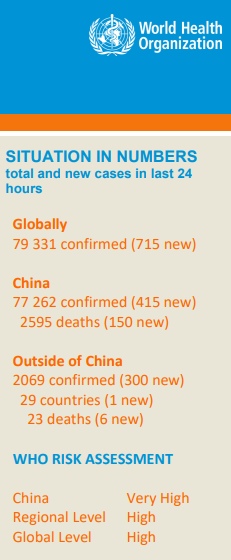COVID-19 Daily Update February 25, 2020
Posted on Feb 25, 2020 in COVID-19National Travel Advisories
The U.S. State Department has issued a level 4 travel advisory asking people not to travel to China due to the COVID-19 outbreak. There is limited access to adequate medical care in affected areas. A level 2 travel advisory has been issued for South Korea and Japan and advises people to exercise increased caution especially for older adults and those with medical conditions.
Before you travel, check out Travel Advisories and Alerts for your destination(s) at www.travel.state.gov/destination. The State Department and the Centers for Disease Control and Prevention provide specific advice to travelers on their websites.
No cases of COVID-19 identified in Hawaii at this time
Currently, there are no cases of COVID-19 identified in Hawaii. DOH is actively preparing for possible cases and working with state, county, and federal partners including the medical community in Hawaii. The following summary as of Feb. 25 shows the number of individuals being monitored or under quarantine because of their recent travel to China. These individuals were identified through screening by federal officials at the Daniel K. Inouye International Airport. These numbers fluctuate often as travelers arrive, depart, or begin and end their self-monitoring with supervision by DOH.
COVID-19 Summary of Numbers as of Feb. 25, 2020
(updated as new information becomes available)
|
Number of Confirmed Case(s) |
0 |
|
Number of Persons Under Investigation (current, testing pending) |
0 |
|
Number of Persons Under Investigation (closed, testing negative) |
0 |
|
Number of Persons Under Quarantine |
0 |
|
Number of Persons Self-Monitoring with DOH supervision |
61 |
Of the 61 individuals who are self-monitoring with public health supervision, 55 are on Oahu, 4 are on Hawaii Island, 1 is on Maui, and 1 is on Kauai.
Confirmed: Meets CDC criteria and positive test result received from a certified laboratory.
Person Under Investigation (PUI): Meets CDC criteria for investigation and testing pending.
Quarantine: Individuals are required to remain in a designated location and separated from others. They are actively monitored by Department of Health staff. Quarantine is enforceable by law.
Monitoring: Individuals voluntarily remain at home and refrain from work, school, gathering places, and public transit. They communicate daily with Department of Health staff.
Screening of arriving passengers at Daniel K. Inouye International Airport in Honolulu
Foreign nationals who have been in mainland China within the last 14 days are being denied entry into the U.S. This includes not only people with a China passport, but all foreign nationals per Department of Homeland Security guidance. The exception is U.S. citizens, legal permanent U.S. residents or their immediate family.
Enhanced screening procedures are in place at Daniel K. Inouye International Airport to help keep the public and traveling community safe. An additional feature is the non-contact thermal temperature scanners that are used for incoming passengers from China. Airport passenger screening continues to be conducted by federal authorities from the Centers for Disease Control and Prevention (CDC) and Customs and Border Protection (CBP). For additional information on the airport screening process submit a media request to CDC.
Prepare now for potential risks
The public health response is multi-layered, with the goal of detecting and minimizing COVID-19. While there are no cases of COVID-19 identified in Hawaii at this time, state health officials do expect to eventually identify cases in Hawaii because this is a global health threat to our entire nation. At this time, the imminent threat here in Hawaii is low. Nevertheless, state and county agencies are intensifying their preparations.
The Department of Health is advising people to take steps now to prepare should the risk of community spread increase.
- Prepare a family plan should there be a COVID-19 outbreak in Hawaii. If you have a large family in one home, consider what measures you can take to prevent the spread of illness.
- Prepare a kit similar to those used during hurricane seasons. These should include a 14 day supply of food, water and other necessities. For more information, visit this site: https://health.hawaii.gov/prepare/protect-your-family/prepare-an-emergency-kit/.
- Set aside an emergency supply of any needed medication and keep a copy of your prescriptions in case you run out of medication. The DOH recommends a three-month supply.
- Don’t forget supplies for your pets.
Preventing the spread of misinformation and disease
The Department of Health is committed to sharing information as it becomes available. People are urged not to spread misinformation or inaccurate statements that are not confirmed, and keep updated and informed on the situation. Everyone can help prevent the spread of respiratory illness with these everyday actions.
- Wash your hands often with soap and water for at least 20 seconds.
- Avoid touching your eyes, nose, and mouth with unwashed hands.
- Avoid close contact with people who are sick.
- Stay home when you are sick.
- Cover your cough or sneeze with a tissue, then throw the tissue in the trash.
- Clean and disinfect frequently touched objects and surfaces using a regular household cleaning spray or wipe.
Wearing Masks
A mask can be effective if you are ill and can prevent the spread of your illness. A mask is not effective to wear when you are well and want to protect yourself from someone who is ill.
